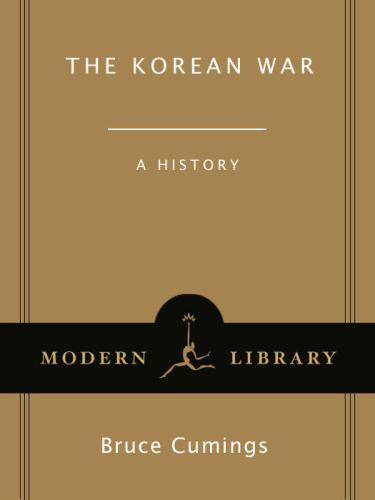
The Korean War
A History
کتاب های مرتبط
- اطلاعات
- نقد و بررسی
- دیدگاه کاربران
نقد و بررسی

October 25, 2010
For many, the Korean War is remembered more for Hawkeye and Klinger than General MacArthur and Syngman Rhee. But for Cumings (Korea's Place in the Sun), professor at the University of Chicago, the critical issue is not one of memory, but of understanding. In this devastating work he shows how little the U.S. knew about who it was fighting, why it was fighting, and even how it was fighting. Though the North Koreans had a reputation for viciousness, according to Cumings, U.S. soldiers actually engaged in more civilian massacres (including dropping over half a million tons of bombs and thousands of tons of napalm, more than was dropped on the entire Pacific theatre in World War II, almost indiscriminately). Cumings deftly reveals how Korea was a clear precursor to Vietnam: a divided country, fighting a long anti-colonial war with a committed and underestimated enemy; enter the U.S., efforts go poorly, disillusionment spreads among soldiers, and lies are told at top levels in an attempt to ignore or obfuscate a relentless stream of bad news. For those who like their truth unvarnished, Cumings's history will be a fresh, welcome take on events that seemed to have long been settled.

Starred review from May 15, 2010
An eloquent, squirm-inducing account of the war's long background and murderous destruction, which began well before the fighting.
Cumings (History/Univ. of Chicago; Dominion from Sea to Sea: Pacific Ascendancy and American Power, 2009, etc.) dismisses the convention that war was launched in 1950 by Stalin's puppet, Kim Il Sung, and ended in 1953. It began, he maintains, in 1931-32 when Japan invaded Manchuria and, as a civil war, hasn't yet ended. Nearby Korea, a Japanese colony, provided most of the resistance. To suppress these resisters, Japan recruited Koreans willing to collaborate, and many rose to high positions. After Japan's 1945 surrender, Kim's circle organized a government in the Soviet-occupied North. The collaborators moved south and, in 1950, formed nearly all of the command of South Korea's army. Ignorant of Korean hatred of Japan, U.S. forces occupying the South retained the colonial system, appointed collaborators to high positions and imported Syngman Rhee from the United States as leader. Knowing which American buttons to push, Rhee announced that he faced vast communist subversion and proceeded to brutally eliminate opposition. Following the war's outbreak, the American media described numerous civilian massacres as North Korean atrocities. Only recently have historians—and declassified U.S. government papers—made known that South Korea committed most of them. American conservatives regularly denounce Cumings for favoring North Korea, but he is widely honored in South Korea, whose researchers have turned up many of the long-suppressed atrocities he reveals.
Few conservatives will change their minds, but Cumings makes a convincing case that Korea, not Vietnam, was the first modern war America entered abysmally ignorant of what it was getting into.
(COPYRIGHT (2010) KIRKUS REVIEWS/NIELSEN BUSINESS MEDIA, INC. ALL RIGHTS RESERVED.)

October 15, 2010
In contrast to the many battlefield histories of what we refer to as "America's Forgotten War," Cumings (Korea's Place in the Sun), an expert on the topic, portrays the three-year struggle as one chapter in a long fight against conquerors and colonialists. In this cultural, not solely military, history, Cumings lambastes nearly everyone involved, noting the atrocities by three armies. North Korean intransigence, indiscriminate strategic bombing, McCarthyism, the execution of inconvenient civilians and refugees, the CIA's disinformation operations, liberal cowardice in the United States, and nuclear threats--all come into the picture here to round out a highly personal view of the war and its milieu. A probably contentious addition to Korean War collections that supplements more tactically focused works.
Copyright 2010 Library Journal, LLC Used with permission.

June 1, 2010
An academic specialist on Korean history, Cumings believes Americans have amnesia about the Korean War of 195053. Or is it the Korean War of 1931 to the present? Cumings goes back that far for an origin to hostilities, seating them in the Japanese invasion of Manchuria and characterizing what happened in June 1950 as an intensification of a Korean civil war, though one definitely escalated by North Korea. These contexts, including the American occupation of South Korea from 194548, are more important in Cumings treatment than the specifically military history of the war, which is dominant in popular American memory of the war. The picture Cumings presents does not flatter American policies, which take hits for supporting a ruthless South Korean government and for destroying North Korean cities. Chronicling atrocities perpetrated by the South, Cummings does not exonerate those committed by the North; the comparison serves his proposition that America intervened in a civil war, to its detriment. Cumings historical expertise will be highly informative background material for those watching the current explosive potential of the North Korean situation.(Reprinted with permission of Booklist, copyright 2010, American Library Association.)

























دیدگاه کاربران